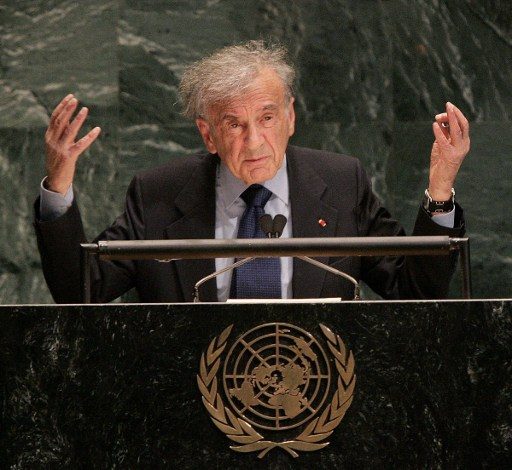SUMMARY
This is AI generated summarization, which may have errors. For context, always refer to the full article.

NEW YORK, United States – Holocaust survivor and Nobel peace laureate Elie Wiesel, whose memoir “Night” detailed his experience in the Auschwitz concentration camp, died Saturday, July 2, at 87.
Throughout his career spanning more than half-a-century Wiesel published dozens of works, including novels, books of essays, plays and cantatas. The following is a sampling of some of his best-known volumes published in English.
- “Night” (1960) – Wiesel‘s internationally acclaimed memoir detailing the terror he survived as a 15-year-old boy living in concentration camps. Originally written in Yiddish and later published in French in 1958, the book was Wiesel‘s first step into the public eye and is now a cornerstone of Holocaust literature.
- “Dawn” (1961) – The sequel to “Night” about a young World War II survivor who settles in Palestine and joins a Jewish underground movement.
- “Day” (1962) – Originally published under the title “The Accident,” Wiesel used this novel to reflect on the horrors he outlived and the deaths of his family and friends. “Night,” “Dawn,” and “Day,” were republished as a trilogy in 1985.
- “A Beggar in Jerusalem” (1970) – A novel set in the days following the 1967 Six-Day War, in which a Holocaust survivor visits a newly reunified Jerusalem that has become fully incorporated into Israeli territory.
- “Souls on Fire: Portraits and Legends of Hasidic Masters” (1972) – A collection of legends, parables and personal reflections about Hasidism, a branch of Orthodox Judaism.
- “The Oath” (1973) – Wiesel‘s novel centered on the sole Jew in a small Hungarian town to survive a pogrom by neighboring Christians.
- “The Trial of God” (1979) – Wiesel‘s play set in a 1649 Ukrainian village, detailing the aftermath of a pogrom.
- “The Golem” (1983) – A compilation of legends associated with the mythical clay creature known as the Golem, retold by a gravedigger who claims to have witnessed miracles performed by the legendary being.
- “The Forgotten” (1992) – In this novel Wiesel follows a psychotherapist and Holocaust survivor suffering from an incurable illness that’s destroying his memory. He confides his memories in his son before losing them completely.
- “All Rivers Run to the Sea: Memoirs” (1995) – The first in Wiesel‘s two-volume autobiography that includes childhood memories from his native Romania, his chilling experience in Nazi concentration camps and his eventual prominence as a Holocaust witness and human rights activist.
Wiesel was known for his profound work that gave voice to the memory of the Jewish people. Here are some of his most memorable quotes and samples of writing.
- “No one is as capable of gratitude as one who has emerged from the kingdom of night.” (Nobel peace prize acceptance speech, 1986)
- “We must always take sides. Neutrality helps the oppressor, never the victim. Silence encourages the tormentor, never the tormented.” (Nobel peace prize acceptance speech, 1986)
- “To forget the dead would be akin to killing them a second time.” (“Night,” 1960)
- “The opposite of love is not hate, it’s indifference. The opposite of beauty is not ugliness, it’s indifference. The opposite of faith is not heresy, it’s indifference. And the opposite of life is not death, but indifference between life and death.” (Interview with US media, 1986)
- “No human race is superior; no religious faith is inferior. All collective judgments are wrong. Only racists make them.” (Interview with Parade Magazine, 1992)
- “Friendship marks a life even more deeply than love. Love risks degenerating into obsession, friendship is never anything but sharing.” (“The Gates of the Forest,” 1966)
- “To forget the victims means to kill them a second time. So I couldn’t prevent the first death. I surely must be capable of saving them from a second death.” (Interview with National Public Radio, 2012)
– Rappler.com
Add a comment
How does this make you feel?
There are no comments yet. Add your comment to start the conversation.